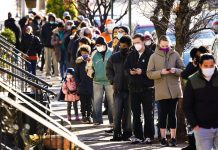Taking the Pulse of America’s Small Business Sector: January 2022
By Daniel Newman
The U.S. Census Bureau’s Small Business Pulse Survey provides timely insight into the condition of the country’s small business sector as economic conditions continue to evolve through the ongoing COVID-19 pandemic. This analysis primarily covers data from December 27th to January 16th, the final weeks before the survey went on hiatus until mid-February.
Here are five things we learned about the small business economy this week:
The Omicron surge has made it difficult for many small businesses to operate at full capacity, particularly in the accommodation and food services industry. The latest Covid-19 surge stymied many employers’ efforts to operate at full capacity last week, leading to a noticeable uptick in the number of small businesses grappling with a decrease in the number of paid employees (14 percent) or a decline in employees’ hours worked (24 percent). Amid the wave of infections that have been sweeping the country, nearly 8.8 million people were out of work in early January either because they suffered from Covid-19 symptoms or were caring for someone who felt sick. That number is the highest reported since the Census Bureau’s Household Pulse Survey began tracking trends early in the pandemic. The accommodation and foods services sector has been particularly hard hit, and more than one-quarter of that industry’s businesses reported a decline in the number of paid employees last week. At the same time, 40 percent had a decrease in the number of hours worked by employees — a level not seen since the end of 2020 amid a similar jump in infections but before vaccinations had really ramped up.
A growing share of small businesses has dealt with falling revenues in recent weeks—the first substantial increase since late 2020. There was a steep increase in the percentage of small businesses reporting a fall in revenue last week: Just over one-third of businesses reported a decline in income, up from 22 percent in late November and the highest share in more than a year. The decrease in revenues comes at a challenging time for many consumers and businesses alike, as widespread concern over inflation has infected nearly every corner of the economy. Nationally more than three-quarters of small businesses on average reported moderate-to-large price increases compared to a pre-pandemic normal, with the construction industry reporting the most widespread effects (91 percent).
Supply chain issues eased somewhat in late December, only to tick up again in the new year. Over 14 percent of small businesses faced production delays in the past week—a high point since tracking began in the summer of 2020. Domestic supplier delays, in particular, remained a core contributor to the production slowdown, as more than 45 percent of small businesses nationwide were experiencing this problem, a level just below the all-time high recorded in the survey results from mid-November 2021. While the effects are widespread across the country, certain industry sectors have been particularly hard hit: manufacturing, retail trade, construction, as well as accommodation and food services.
A small but increasing share of businesses requires proof of vaccination or a negative test result to work and are primarily concentrated in just a handful of states.
The share of small businesses requiring employees to show proof of vaccination or a negative test before coming to work has steadily ticked up by several percentage points in recent weeks. Around 15 percent of small businesses nationwide required employees to have received a vaccine, while just under 16 percent required workers to have a negative test before coming to work. Some of the states where businesses report being most negatively affected by the pandemic, such as New York, California, or Washington, are much more likely to require proof of vaccination to work.
Despite the Omicron surge, half as many businesses foresee the need for additional financial assistance as did a year ago amid growing concerns over inflation, supply chain woes, and tight labor markets.
Even as Congress discusses the possibility of another round of assistance to small businesses reeling from the effects of the Omicron surge, the needs of businesses have changed significantly over the past year. In January 2021, more than one-third of businesses indicated a need for financial assistance or additional capital, yet that share has shrunk by more than half to 16 percent last week. As economic circumstances continue to evolve and businesses look to their needs over the next six months, many have instead identified the need to hire new employees (41 percent) and find new supply chain options (23 percent) as growing priorities relative to a year ago.









































